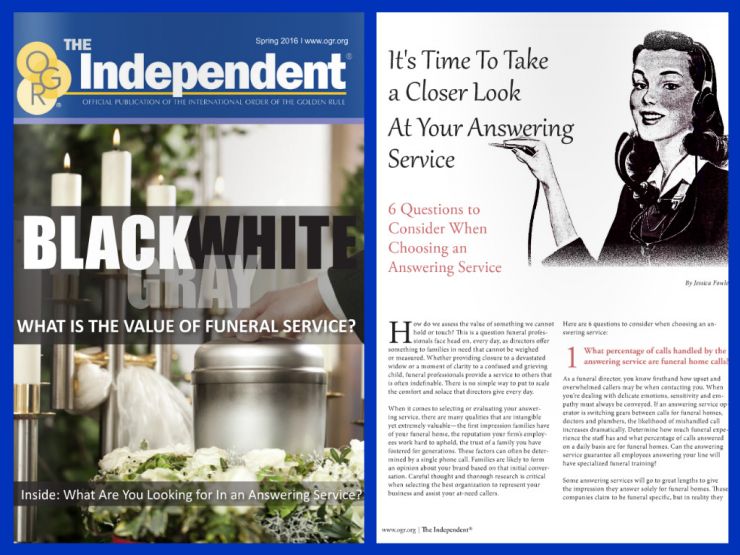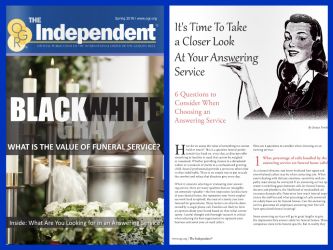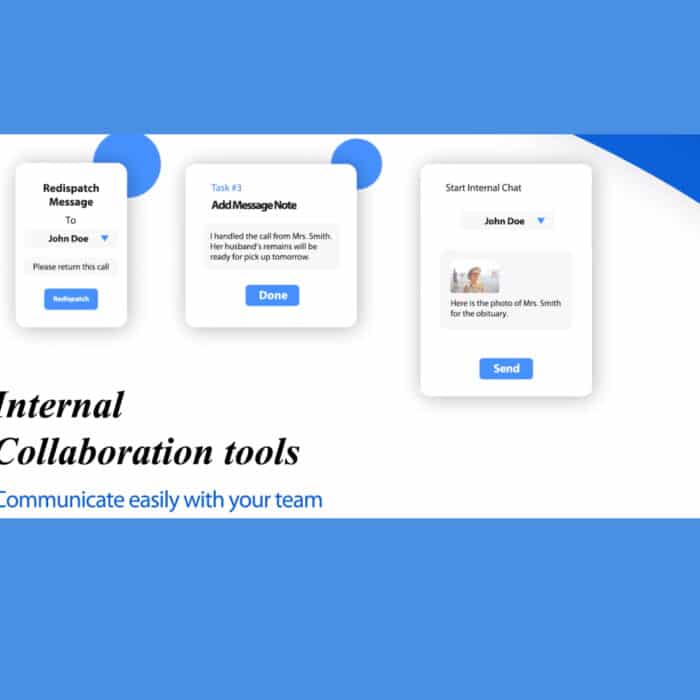Jun 09, 2016
This article was written by ASD Staff Writer, Jessica Fowler, and was originally published in the Spring 2016 issue of The Independent – the official publication of the OGR. The article outlines what considerations should be made by funeral directors when evaluating an answering service and explains why careful thought and thorough research is critical when selecting the best organization to assist at-need callers.

How do we assess the value of something we cannot hold or touch? This is a question funeral professionals face head on, every day, as directors offer something to families in need that cannot be weighed or measured. Whether providing closure to a devastated widow or a moment of clarity to a confused and grieving child, funeral professionals provide a service to others that is often indefinable. There is no simple way to put to scale the comfort and solace that directors give every day.
When it comes to selecting or evaluating your answering service, there are many qualities that are intangible yet extremely valuable—the first impression families have of your funeral home, the reputation your firm’s employees work hard to uphold, the trust of a family you have fostered for generations. These factors can often be determined by a single phone call. Families are likely to form an opinion about your brand based on that initial conversation. Careful thought and thorough research is critical when selecting the best organization to represent your business and assist your at-need callers.
Here are 6 questions to consider when choosing an answering service:
1. What percentage of calls handled by the answering service are funeral home calls?
As a funeral director, you know firsthand how upset and overwhelmed callers may be when contacting you. When you’re dealing with delicate emotions, sensitivity and empathy must always be conveyed. If an answering service operator is switching gears between calls for funeral homes, doctors and plumbers, the likelihood of mishandled call increases dramatically. Determine how much funeral experience the staff has and what percentage of calls answered on a daily basis are for funeral homes. Can the answering service guarantee all employees answering your line will have specialized funeral training?
Some answering services will go to great lengths to give the impression they answer solely for funeral homes. These companies claim to be funeral specific, but in reality they answer for all types of businesses. They use more than one business name, website and phone number to create an illusion of funeral exclusivity. However, a quick Google search of the owner’s name or company address reveals that a larger, generic answering service actually owns the company. Don’t be fooled by this artful deception. When it comes to protecting your calls and your brand, there is no substitute for experience and dependability.
2. How transparent is the operation?
To evaluate an answering service properly, you must take an active role in monitoring how calls are handled. With today’s technology, there is no reason why a recording of all your calls should not be available. An answering service that invests in its training and staff will encourage customers to listen to their messages and offer feedback. Unfortunately, some companies will not disclose call recordings to conceal shortcomings. Find out how much control and oversight you will have before forwarding your lines to any answering service.
In addition to having access to recordings of every call, you should be able to determine to whom and when the call was delivered. Some companies offer a “dispatch log” showing everyone who was notified or reached for a critical call. This will help you evaluate the answering service’s responsiveness and accuracy. When families are distraught, a few minutes can feel like a lifetime. Your answering service should disclose the number of times the phone rang before the line was answered. This knowledge will give you peace of mind that your callers are not routinely put on hold for long periods of time. Answering services that don’t disclose these details leave funeral directors in the dark with no way of knowing how their callers are treated.
3. Does the answering service provide tools to help you grow?
It is very common for an at-need, preneed or pricing call to occur after hours. It is critical to ensure that your answering service understands the value of these calls and has solutions in place to protect new business opportunities. In addition to recognizing the significance of these calls, your answering service should also offer tools that can improve response time and enhance the level of service to your families. Here are a few questions to consider when evaluating if an answering service can deliver a competitive edge for your funeral home.
► Can the service connect price shoppers directly to you?
Rather than allowing price shoppers to hang up and call another funeral home, some answering services offer an option to connect these sensitive calls to the on-call director.
► Can the service alert you the moment a death is first reported?
The moment your service recognizes someone has passed, you should receive an alert so that you can politely excuse yourself from any situation and find an appropriate place to handle the new first call.
► Does the service allow you to connect into a first call in progress?
When a death is reported, your service should provide an option that enables you to join in on the first call in progress just as if you are picking up a second line at the funeral home.
► Does the service offer a tool that lets you display the funeral home’s office number as your outgoing Caller ID?
Rather than giving out your cell phone number every time you return a call, a new answering service solution now exists that allows you to display the funeral home’s office line as your outgoing Caller ID.
► Can the answering service work with your transport company?
Today, many funeral homes rely on a Transport Company when a death occurs after hours. Find out if the answering service can create specific instructions and contact procedures to help coordinate removals.
4. Is the answering service convenient to use?
Funeral professionals are constantly on the go meeting with families, conducting services, handling removals and accomplishing other important tasks. With the advent of cellular technology, Wi-Fi, mobile apps and email, directors have found freedom by taking their businesses on the go. When you’re on call, your answering service should be able to provide several options that allow you to track and monitor your telephone activity. Receiving messages via text, email or push notification frees you from being interrupted by a telephone call when you’re on a service, with a family or driving.
Most answering services can offer technology that connects the entire staff to a central communication portal either through a smartphone app or mobile website. You should also have the ability to share messages and phone recordings to easily relay vital information to your staff. Before choosing an answering service, find out what tools and solutions they have developed to help when you’re on-call. Request a video tutorial of their technology to understand what features are available and to evaluate the accessibility of their programs.
5. How does the answering service bill?
With many funeral homes feeling the impact of a cautious economic climate, the need to establish defined payment schedules with vendors has become increasingly important. Be sure to inquire about the answering service’s billing structure and how to minimize costs. Answering services generally bill per minute or per phone call and offer tiered call plans based on call volume. You should have access to a detailed list of every billable call. Listen to your calls to confirm that the amount of time you are billed matches the actual length of each call. Keep in mind there may be some extra Operator time that is included, but that certainly should not double the amount you are billed. If the service assesses any fees such as an extra charge for taking calls on a holiday, this information should be disclosed to you as well. Monitoring your usage and invoices will guard against paying more than you should.
Most answering services will offer a free trial period in order to recommend a billing plan based on your call volume. Your answering service should give you the flexibility to change this anytime and proactively reach out if your plan becomes too high in the future. Answering services will generally charge for both incoming calls and outgoing dispatches. However, some companies allow customers to greatly reduce their outgoing calls by using technology. By responding to urgent messages via text, email, website link or push notification, directors can reduce their billable calls while also eliminating unnecessary telephone distractions.
6. Does the service require a term contract?
The funeral business is inherently unpredictable and your needs may change unexpectedly. Be wary of term contracts requiring you to use an answering service exclusively for any length of time. A rigid contractual agreement can cause major headaches down the road if at any point you become dissatisfied with the service provided. Look for an answering service that offers greater flexibility and freedom to keep your options open in the future. The quality of the company’s performance should be enough to retain your business.
Click here to read more articles by ASD.
About The Author
Jess Farren (Fowler)
Jess Farren (Fowler) is a Public Relations Specialist and Staff Writer who has been a part of the ASD team since 2003. Jess manages ASD’s company blog and has been published in several funeral trade magazines. She has written articles on a variety of subjects including communication, business planning, technology, marketing and funeral trends. You can contact Jess directly at Jess@myASD.com


